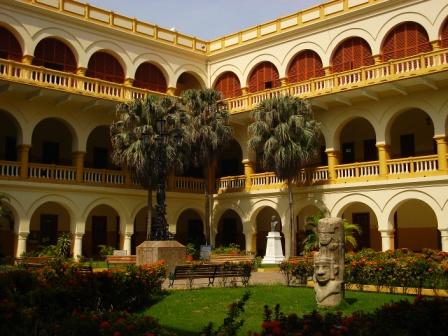
Before delving into an analysis and survey of an author's work, I think it is important to understand their biography and have a background knowledge of them. For example, we can listen to Beethoven's Ninth Symphony and enjoy how awesome it is, but when we know that he composed it after going completely deaf, doesn't that make the listening experience so much richer?
- Gabriel Garcia Márquez was born in Aracataca, in the province of La Guajira, a small town in northern Colombia in 1928. The town is situated in a tropical region between mountains and the Caribbean Sea. The surface area of Colombia is twice the size of Texas and has a population of about 30,000,000. Like many South American countries, Colombia enjoys a variety of landscapes.
With such a beautiful landscape to stimulate imagination, it is easy to see how García"Its geographic spread includes the sparsely settled eastern plains, the high chill of the Andean chain and Bogotá, the coastal heat of the Caribbean provinces, the desert desolation of the Guajira peninsula jutting to the northeast, the lush "eternal spring" of the western Cordillera Central and the Cauca Valley with its cities Medellín and Cali, and the vast, humid Amazon bush dipping four degrees south beyond the equator. Colombia is the one mainland South American country blessed with both Atlantic and Pacific littorals; it shares borders with Venezuela, Ecuador, Peru, and Brazil; and through Panama(formerly Colombian territory) it has a Central American frontier." (Bell-Villada 15)
Márquez was able to come up with a place as spectacular as the fictitious Macondo.
- His father was a telegraphist and he was not approved of by his wife's family since he was an outsider. Because of the family's disapproval, the couple moved away but García Márquez's mother returned to her home town to give birth to their first child, Gabriel. She ended up leaving him with her parents in order to return to her husband. He was raised by his maternal grandparents and his grandfather,Nicolás Márquez Iguarán, was a colonel in the civil war during the start of the century. He stayed there until his grandfather died when the boy was only eight years old. García Márquez has been quoted in many interviews throughout his life that "nothing interesting has happened to me since then".

- He originally attended a Jesuit college, University of Cartagena,(above photo) to pursue studies in law but became involved in journalism. During the late 1940's, he wrote for El Universal in Cartagena. In 1954, he was sent to Rome for an assignment and that spurred on travel and living abroad in his life. He began to publish literary work in 1955 with his first book, La hojarasca( the leaf storm). Along with writing fiction, he continued to work as a journalist and to write screenplays.
- In June of 1967, Editorial Sudamerica published Cien Años de Soledad. The initial printing was only 8,000 copies and now has been translated into over 35 languages and has sold 30,000,000 copies worldwide.
García Márquez is often heralded as the premiere Colombian writer and for plenty of good reasons. The Colombian people love him, his work, and what he represents for them. In his home country, he's nicknamed "Gabo" as a term of endearment. When his Nobel Prize was announced in 1982, people were excited to be able to call him their own.


No comments:
Post a Comment